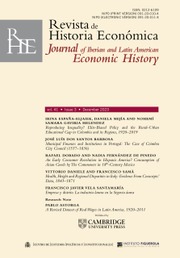Article contents
Electricidad e industria en la España rural: el Irati, 1904–1961*
Published online by Cambridge University Press: 13 January 2010
Abstract
The study of the Irati hydroelectric company aims to show some of the business strategies behind the first stages of the development of electricity in Spain and, in turn, pose new questions regarding the factors and conditioning elements of the country's regional industrialization processes. In fact, this firm represents one of the many possibilities electricity brought to non-industrialized Spanish regions at the start of the 20th century. The electricity generated by its falls explains the creation of Spain's largest integrated industrial complex built up around the initial processing of timber (saw-mills and chemical distilling) and its commercialization (railways), along with the sale of its energy surpluses on the most important market in the region of Navarre. Furthermore, the analysis of this latter activity allows us to offer an explanatory model that is both an alternative and a complement to the classical model —that provided by the largest firms—concerning the progressive incorporation of the traditional electrical markets into the integrated markets of the major Spanish companies.
Resumen
El estudio del Irati pretende mostrar algunos de los comportamientos empresariales que se esconden detrás de las primeras fases del desarrollo eléctrico español y, a su vez, establecer nuevas preguntas sobre los factores y condicionamientos de los procesos regionales de industrialización. De hecho, esta firma representa una de las múltiples posibilidades abiertas por la electricidad en una región española no industrializada a principios del siglo XX. La producción eléctrica generada en sus saltos explica la creación del mayor complejo industrial integrado en España alrededor de la primera transformación de la madera (serrerías y destilación química) y su comercialización (ferrocarril), al tiempo que la venta de sus excedentes energéticos en el mercado más importante de Navarra. El análisis de esta última actividad, además, permite ofrecer un modelo explicativo alternativo y complementario al clásico—realizado desde las mayores firmas—, sobre la progresiva articulación de los mercados eléctricos tradicionales en los mercados integrados de las grandes compañías españolas.
Keywords
- Type
- Articles/Artículos
- Information
- Revista de Historia Economica - Journal of Iberian and Latin American Economic History , Volume 24 , Issue 1 , Primavera 2006 , pp. 97 - 138
- Copyright
- Copyright © Instituto Figuerola de Historia y Ciencias Sociales, Universidad Carlos III de Madrid 2006
References
Bibliografía
- 4
- Cited by


